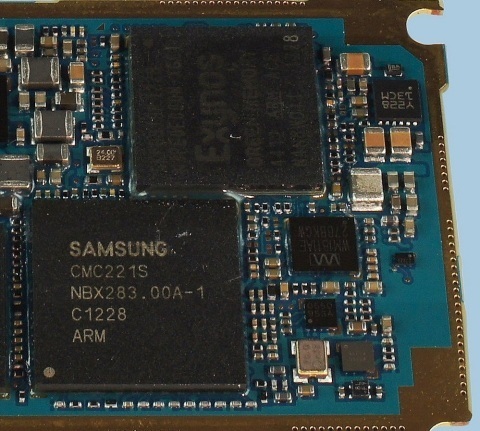In a new smartphone teardown, ABI Research today announced that it has discovered that Samsung is now using its own radio modem in the new Galaxy SIII E210s, which was very recently released in Korea, ABI suggests that Samsung is “sending a message to the chipset giant Qualcomm by dropping the Qualcomm modem in favor of its home grown solution.” It is certainly true that Samsung has been known for outsourcing modem chipsets. Its own strengths have long been focused on high-end application processors (and NAND memory) that appear in a number of its smartphones.
It is also known as well for its manufacturing prowess – let’s not forget that it builds the Apple-designed A6X processor that currently powers the iPhone 5. Historically, however the company has turned to modems from Qualcomm, Intel, Broadcom, STE, and Via Telecom. The new phone, however, is powered by a single chip HSPA/LTE integrated circuit designed and manufactured by Samsung. The image below from ABI’s teardown shows the modem.

Key Samsung Galaxy SIII LTE (SHV-E210s) components that ABI uncovered include the following:
- Samsung 2G/3G/4G 40nm modem- CMC221S (same main die as predecessor- CMC2200)
- Samsung Quad core Exynos 4412 application processor
- Samsung high performance ISP
- Triquint QuadBand EDGE PA, AVAGO and RFMD 3G PAs
- Broadcom BCM4334 WiFi/BT/FM single chip
- Wolfson high performance Audio Hub WM1811AE
- Knowles Mem microphones
- STM Gyro and pressure sensor
- FCI 2G/3G/4G transceiver FC7860
- Maxim power management
As Samsung continues to capture more share of the smartphone market, Samsung’s growing reliance upon captive market solutions, according to ABI “could prove to be a major concern for suppliers such as Qualcomm and Via Telecom. This move to manufacturing its own solutions plus Samsung’s recent purchase of CSR’s handset business could prove a key turning point that signifies a shift in the handset component market towards a platform battle between two major powerhouses of the mobile industry.”
That said, it was inevitable that Samsung would eventually outgrow its need to outsource its modems. It has patents it needs to put to use, and it needs to demonstrate its own wherewithal to do so – that is, after all, the genetic makeup of Samsung.
Of course it also needs to demonstrate that it doesn’t need to rely on external partners. In great part this is necessary to show to the outside world that Samsung is an innovator at every level of the process – from the chips to the software. Samsung’s CEL is well known for believing powerfully in the power of software (hence Bada, among other efforts to create software and mobile operating systems). But Samsung also believes it needs to demonstrate that innovation on the hardware side. Qualcomm and the other vendors need to face that reality.
It isn’t a war. It’s just good business.
Edited by
Brooke Neuman  QUICK LINKS
QUICK LINKS